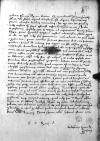List #671
Conradus GOCLENIUS (WACKERS) do Ioannes DANTISCUSLeuven (Lovanium), 1531-08-16
| odebrano Brussels, [1531]-08-19 Rękopiśmienne podstawy źródłowe:
Pomocnicze podstawy źródłowe:
Publikacje:
| ||||||||||
Tekst + aparat krytyczny + komentarz Zwykły tekst Tekst + komentarz Tekst + aparat krytyczny
Reverendissimo Domino Ioanni Dantisco episcopo Culmensi, serenissimi
Salutem plurimam.
Reverendissime Domine.
Quemadmodum servi in comoediis solent, ubi scelus aliquod commiserunt, sibi aliquem deprecatorem parare adversus herilem iracundiam, ita ego non ita pridem mihi conscius, quam parum officiose responderim tuo in me studio et postremae epistolae, quo te uterer ad impetrationem veniae placabiliore, prius
Interim tamen dum pendeo animi, illud mihi persuadebo, quod maxime est in votis, te vel admisisse excusationem meam, vel certe negligentiae, si quam arbitrere commissam, ignovisse. Quid enim non persuadeam de te mihi, cuius humanitatem, ut ceteras virtutes taceam, nemo est paulo humanior tota
Ceterum quod ad beneficium tuum nuperrimum pertinet, quo effectum est, ut inter candidatos caesareae gratiae mei quoque nominis ratio haberetur, non habeo quibus verbis explicem, quantum me tibi debere confiteor. Timanthem igitur illum imitabor, et quod omnem meam dicendi facultatem exsuperat tacito animo iudicio venerabor ac parentis loco mihi semper habendum existimabo tanti muneris auctorem, quod mihi per Tuam Reverendissimam Celsitudinem, et domini
Bene vale.
Eidem Tuae Reverendissimae Dominationi deditissimis

